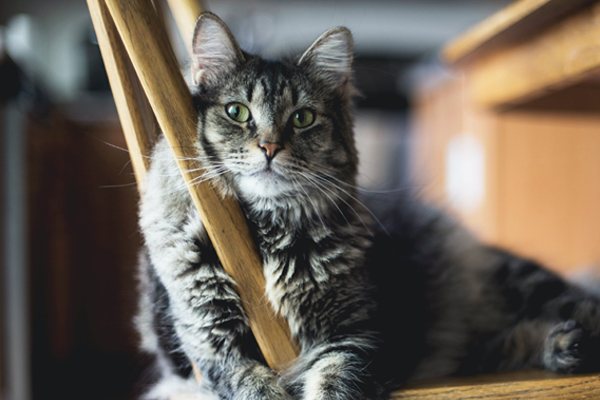
Approximately 67% of U.S. households owned a pet in 2019 according to The American Pet Products Association (APPA), and out of all those pets, one third were cats. Even though cats cost a fair amount less to feed, house, and maintain compared to dogs, as well as there being arguably a larger population of cats in the U.S. compared to dogs, veterinarians see a lot more dogs each year than cats.
It’s just as important, if not more so, for cats to visit the vet as it is for dogs, but there is a distinct difference in the number of visits for felines versus canines. Even with feline vet costs being lower than those for dogs, cats still don’t show up at veterinary clinics as much as dogs. In fact, according to Pet CareRX, almost twice as many cats than dogs never visit the veterinarian in the first place. And of the cats that do visit vet offices, they still average over 25% fewer visits than dogs.
Could it be that cats hide symptoms better than dogs? Perhaps since cats are more independent, their owners think they can take care of themselves better than dogs. Is it possible that since cats are out of sight more than dogs that they also end up being out of mind more as well? Perhaps because feline vaccinations are now being given every three years or less, there just isn’t the perceived need to visit the vet more than that. Cats can be harder to transport than dogs. Maybe this plays into a cat owner’s decision. Richell’s Double Door Pet Carrier could be a perfect solution for this problem.
Whatever the reason, the fact is that cats should visit the vet once or twice a year and certainly as much as their dog counterparts. It’s not easy, but it’s necessary for preventative healthcare. And with any luck, the benefits described below could help justify the need to keep our vets busier with visits from our feline companions.
Physical Exam
A yearly or semi-annual check-up or thorough physical exam is important for all animals, but especially for cats since they tend to hide ailments better than many other animals. Hidden health issues can be a real concern with felines, so staying proactive and ahead of the curve is a lot more desirable than having to be reactive to an illness or emergency all of a sudden. Your vet will be able to check your cat over, ask you questions about your cat, field your questions, feel for any abnormalities, and advise on any routine care that may be necessary. And it is a great time to work with your veterinarian on a plan to help your cat remain healthy.
Richell Double Door Dog and Cat Carrier
Lab Work
Running labs on a cat can reveal important clues as to what your feline could be hiding, considering they can be so independent and aloof. Lab tests can be run for any type of possible issue and are very accurate for determining if something is amiss. Just as we get lab work as part of our yearly physical, cats need this same level of preventative care to help cat owners stay in front of any potential issues.
Shots
Vaccinations are important for any animal, but since more cats live indoors with us than dogs, felines need to be up to date on all their shots. Since cats tend to roam a fair distance outside and then come back indoors, zoonotic diseases that can jump from animals to humans come into play more easily. The last thing cat owners want is to catch a disease from their feline companion when they are curled up together in front of the tv.
Spaying or Neutering
There are already too many homeless animals in this world. And many of them are cats. It’s important that each cat is spayed or neutered if not being purposely bred, so pet overpopulation is kept in check as much as possible. It’s the responsible course of action, especially if there are multiple cats in the home or if your cat lives both indoors and outdoors. The last thing any cat lover wants to see are homeless kittens, cats, or other possible outcomes.
Declawing
As the number one reason cat owners bring their feline companions to the vet, it is a consideration that has crossed many cat owners’ minds. Some feel it is too cruel to declaw cats, but others who don’t want expensive furniture or fixtures all scratched up swear by the procedure. If considering declawing your cat, be sure to do plenty of research ahead of time into the advantages and drawbacks of this surgical procedure. A manicure it is not.
Age
Cats can reach a human equivalent of 15 years of age in their first year, then to around age 24 in human years by their second year. Each year after that they age about 4 human years. Veterinarian care is important each year since a lot can happen in four “cat years”. If it’s not routine already, it’s especially good to make yearly or semi-annual vet visits routine by the time a cat is 7 years old since they will be approaching middle age at that point.
Weight Monitoring
According to the American Association of Feline Practitioners, over 50% of cats are overweight or obese. A visit to the vet will allow your veterinarian to check your cat’s weight and provide any nutritional or special diet recommendations to keep your cat at their ideal weight. Only a few pounds overweight can put your cat at risk for heart, respiratory, and kidney disease in addition to diabetes.
Behavioral Analysis
A few of the most common reasons cats are abandoned or taken to shelters include issues with urination that is inappropriate and the scratching of furniture or other household items. If caught in time, veterinarians can intervene and help put a stop to these problems when they first begin before they become second nature to your cat. Your vet will rule out any medical reason why the behavior is taking place and give you instructions and tips if the problem ends up being behavioral.
Dental Care
Cats can develop plaque, tartar, gingivitis, loose teeth, abscesses, sores, and many other mouth and dental issues. With kittens having 26 teeth and adults having 30, there is plenty of potential for dental problems. It’s difficult for cat owners to diagnose dental issues on their own unless they have been trained. That’s where a visit to the vet comes in. Your vet will look at your cat’s gums and teeth during each visit and formulate a proactive approach to dental care that can take place instead of trying to correct something preventable. Periodontal disease becomes fairly common in cats that are three or older, and there are often no obvious signs. Many cats can still eat normally even though they may be suffering from dental disease.
Parasites
Cats are susceptible to parasites just like dogs. Even indoor cats can pick up parasites such as ticks, fleas, heartworms, or roundworms from insects that get into the house, family dogs, or on the shoes and clothing of family members. Many felines don’t exhibit symptoms caused by parasites and unfortunately, many parasites are zoonotic which means they can affect humans as well. One such example is roundworms which can lead to severe medical issues. It’s important to visit the vet regularly so your cat can be checked for any parasites.
As can be seen from the examples above, it’s just as important to take cats in for regular vet visits as it is dogs. And in some cases, it’s more important since cats are masterful at hiding illnesses. Since cats age much more quickly than humans and with over 50% of cats being overweight or obese and subject to illnesses related to obesity, it’s much more prudent to be proactive with their health than reactive. Regular vet visits can end up not only saving your cat’s life, but it can also end up being less expensive in the long run.
 10 Dog Walking Tips for an Enjoyable Outing
10 Dog Walking Tips for an Enjoyable Outing
07.27.2020
A walk in the park, a stroll around town, or a tour through the neighborhood should be a pleasant experience for both a dog owner and man’s best friend. >>> READ MORE
 Top 15 Reasons to Adopt a Cat from a Shelter
Top 15 Reasons to Adopt a Cat from a Shelter
06.10.2020
If there is one silver lining to the current pandemic, it is that animal shelters are finding it hard to offer up as many cats and dogs for adoption as they typically do. . >>> READ MORE
 How Pets are Helping Us with Our New Stay At Home Routine
How Pets are Helping Us with Our New Stay At Home Routine
04.30.2020
If you are a pet parent then you already know pets require a good deal of attention, care, and exercise, whether you are at home or not. >>> READ MORE
Please complete this form and click "Submit". Our Customer Support team will gladly address your request and respond in a timely manner.
Richell USA, Inc.
Copyright © Richell, Inc.. All rights reserved